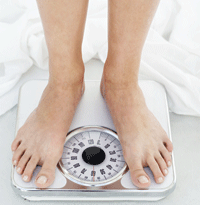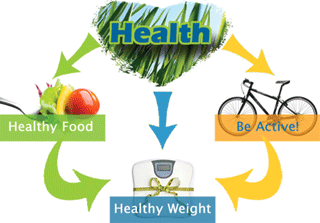Why Is a Healthy Weight Important? – Saira Gillani, ND

Author by Saira Gillani, ND
In the United States, it is estimated that diabetes can be up to six times more common in South Asian communities. This in turn can lead to a number of serious health problems, including coronary heart disease, kidney disease and eye problems. These health issues can affect anyone. However, a few healthy changes to diet and lifestyle can help you lose weight and reduce health risks.
Reaching and maintaining a healthy weight is important for overall health and can help you prevent and control many diseases and conditions. If you are overweight or obese, you are at a higher risk of developing serious health problems. That is why maintaining a healthy weight is so important.
What Is Being Overweight and Obesity?
Overweight is having extra body weight from muscle, bone, fat, and/or water. Obesity is
having a high amount of extra body fat. Body mass index (BMI) is a useful measure of over
weight and obesity.
Trends and Impact of Obesity on South Asians
The prevalence of obesity of South Asians in the U.S. population has increased dramatically over the past 30 years. According to the IHS Clinical Reporting System, over 80 percent of South Asian adults ages 20 to 74 are overweight or obese; among children and youth, between 45 percent and 51 percent are not at a healthy weight. The most recent estimate puts the cost of obesity-related medical spending alone in the United States at $147 billion per year in 2008, compared with $78.5 billion in 1998. This accounts for almost 10 percent of all medical spending.
 What Is a Healthy Weight?
What Is a Healthy Weight?
For adults, a normal or healthy weight is defined as an appropriate weight in relation to height. This ratio of weight to height is known as the body mass index (BMI). BMIs for youth 2–20 years old are determined by comparing their weight and height against growth charts that take their age and gender into account.
What Factors Contribute To a Healthy Weight?
Many factors can contribute to a person’s weight. These factors include environment, family history and genetics, metabolism, and habits.
 Tips to Help you Reach and Maintain a Healthy Weight
Tips to Help you Reach and Maintain a Healthy Weight
Be physically active. Regular physical activity burns calories and builds muscle. Both will help you look and feel great and keep weight off. A brisk walk in the mall, cleaning the house, taking the stairs instead of the elevator, and doing other things that increase your daily level of activity can make all of the difference. If you want to burn additional calories, increase the intensity of your workout and add some strength training to build muscle. The more muscle you have, the more calories you burn. Exercise Goals should be 30 minutes of cardio exercise 4-5 days per week (Example. Elliptical, walking, swimming, exercise classes) and 30 minutes of weight training 2-3 days per week.
Reduce screen time.
One reason people get less exercise is because of an increase in the amount of time spent watching television, looking at the computer, or playing video games. Limit screen time to less than 2 hours per day.
Eat Healthy Meals. Eat small meals, the size of your palm. Include more lean proteins into your diet including: Chicken, Salmon, Tuna, Eggs (1 full egg and 1 egg white), Greek Yogurt, Spinach, Broccoli, Cheese, Legumes, Tofu, Buffalo, and Turkey. Eat slowly to avoid overeating. Eat more fiber; the best source is found in fresh fruits and vegetables. Graze on healthy snacks all day.
Example of a Healthy Diet:
- Breakfast- 1- 4 ounce Lean Protein, 1 carbohydrate, 1 fruit or vegetable
- Snack- small meal, such as nuts, fruit with almond butter, or greek yogurt
- Lunch- 1 – 4 ounce Lean Protein, 1 carbohydrate, 2 vegetables Snack- small meal
- Dinner- 1- 4 ounce Lean Protein, 2 vegetables
Water.
Drink 1 glass of water before meals to ensure no overeating. Drink at least 8 glasses per day or your weight divided by 2 in ounces.
Carbohydrates.
Cut out Carbohydrates after 3pm and eat your last meal 3 hours before sleeping.
Foods to Avoid.
Foods to avoid are Fried Foods (Example. Fried chicken, French fries), creamy dressings or creamy condiments, creamy sauces, white carbohydrates (Example: white potatoes, white bread, white pastas and rice), alcohol, and red meat.
Eat less sugary foods.
Cut down on sweets, cakes, cupcakes, brownies, and sweet drinks such as lassi or milkshakes. For desserts or snacks try Greek yogurt, fruits paired with almond butter, hummus with vegetables, nuts, or try drinking water instead. Hunger is often mistaken for thirst.
 Eat less processed foods.
Eat less processed foods.
This includes any foods that are packaged with preservatives and food colorings such as snack foods, fast foods, packaged meals, etc. These can be high in fat and salt. Opt for White cheese instead of yellow cheeses because yellow cheeses have more preservatives.Always try to go for more natural, real foods.
Eat less salt.
Too much salt can cause blood pressure to rise, which can lead to a heart attack or stroke. Avoid adding salt to food when you are cooking and substitute it with lemon, pepper or other spices.Salt is often added to ready-made and processed foods, including bread, cereals and soup. Reading food labels can help you control how much salt you eat.
Eat less saturated fat.
Saturated fat is found in butter, ghee, full-flavored milk, biscuits, pastries and cakes. Too much saturated fat can raise the level of cholesterol in the body, which is a risk factor for heart disease, lead to weight gain and increase the risk of diabetes and other health problems. Reduce the amount of
saturated fat in your diet by:trimming the fat off meat,
taking the skin off chicken, using skim milk, and avoiding foods that you know are high in fat.
Add Good Fats Into Your Diet.
This can be found in oily fish such as wild Alaskan salmon, avoca do, nuts and seeds, olive oil, and spreads made from these oils.
Eat less deep-fried food.
Foods that have been deep-fried in oil or ghee, such as samosas, are high in saturated fat. Try steaming, baking, boiling or grilling food instead.
Eat more fruit and vegetables.
Aim for five portions of fruits and vegetables per day. Fruits and vegetables are more than just vitamins and minerals. They are also packed with fiber, which means they fill you up. And when you fill up on fruits and vegetables, you are less likely to overeat when it comes to high-calorie foods like chips or cookies.
Eat more beans and lentils.
Beans and pulses, including lentils, chickpeas, peas and beans, are low in fat and high in fiber. Avoid frying pulses.
Make healthy swaps.
When you’re cooking or snacking, go for a healthy option. Swap ice cream for nonfat Greek yogurt, swap sweets for fruit, or have nuts instead of chocolate.
 Watch out for portion distortion.
Watch out for portion distortion.
Portion sizes are bigger than they used to be, and these extra calories contribute to obesity. When eating out, share a meal or divide the portion in half and take half home. Another key factor in weight gain is that more people drink sugary beverages, such as sodas, juice drinks, and sports drinks. Go for water or low-fat milk instead of soda.
Drink Hot Green Tea.
Green tea has been shown to increase metabolism and reduce signs of disabilities by 33% when drinking at least 3 cups per day.
Don’t skip breakfast.
Most often, individuals will skip meals, especially breakfast, which can lead them to indulge in larger meals throughout the day. This can also play a huge effect on blood sugar levels and hormones causing someone to binge on processed carbohydrates and sugary foods. This is a disaster for someone trying to lose weight. People who skip breakfast often feel so hungry that they eat more later on. So they get more calories than they would have if they ate breakfast. In fact, people who skip breakfast tend to have higher BMIs than people who eat breakfast. Eat breakfast 30 minutes within waking up to jump start metabolism and burn calories immediately. This will also give you energy to do more during the day.
Add Herbs into Your Diet to Speed up Metabolism.
Apple pectin is a fiber that can be obtained in supplement form. It is a powder obtained from dried apples. Apple pectin lowers cholesterol levels, helps prevent hardening of the arteries, diabetes and may inhibit cancer metastases. Apple pectin corrects constipation and promotes digestive health including promoting the health of intestinal flora. Apple pectin is tolerated by most people with allergies. It helps you to stay full longer. Recommended Dosage: 500mg 3 times per day.Grapeseed extracthelps you to burn fat. Grapeseed extract increases metabolism and you can burn a lot of calories with it. Take 150mg of grapeseed extract once a day, and it is also great for edema and swelling of the legs. Recommended Dosage: 150mg per day. Chia Seed- 2 scoops or 4 tablespoons per day for digestion. Chia Seed is a natural fiber.Turmeric- The active ingredient is curcumin. Taking a turmeric supplement increases the production of vital enzymes of the liver, thus increasing the liver function, which will help you maintain your weight. Recent studies also show turmeric as a powerful anti-oxidant, which works to destroy free radicals in your body responsible for damaging body cells.
 4 Miracle Foods for Weight Loss
4 Miracle Foods for Weight Loss
– Grapefruit, Chili peppers, Pistachio nuts, Jicama. Grapefruit decreases the appetite. Chili peppers helps burn calories, (if you did nothing and you eat chili peppers you can burn 10 calories in 4 hours). Pistachio nuts blocks carbohydrates from being absorbed, they are low in fat and the highest fiber nut out there. Jicama keeps you full, you just grate it like a carrot for a salad.
Get Tested.
Food/substance sensitivities, adrenal fatigue, thyroid issues, and/or vitamin or mineral deficiencies may be the root cause of inability to lose weight. Natural Health Atlanta offers these tests to patients to help optimize their body’s performance and energy levels.Most major insurance plans accepted.
About the Author
Dr. Saira Gillani, ND, CTN, CNW, MBA has been Double Board Certified as a Traditional Naturopath and in Nutritional Wellness from the American Naturopathic Certification Board, and has her Doctorate of Naturopathy from Clayton College of Natural Health, graduating Magna Cum Laude. To learn more about Natural Health Atlanta, visit www.naturalhealthatlanta.com or call (678) 892-6865.
























